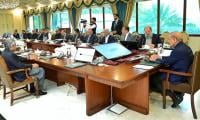ISLAMABAD: State Bank Governor Dr Reza Baqir has credited the government's economic team for its 'tough decisions' that led to Moody's change in outlook on Pakistan's economy from negative to stable.
In a statement on Tuesday, Baqir noted that the step devaluations of the exchange rate resulted in it being changed to a market based system since May 2019. He said that these decisions helped enable domestic industries to compete with imports and make Pakistan's exports competitive.
The governor stated that expensive imports had been curbed and a sustained development had been brought about in the current account, leading to an increase in the state bank's reserves net of liabilities.
He noted that the improvement in the stock market was an indicator of the positive market sentiment and how Pakistan's finances were headed towards a sustainable footing. Baqir emphasised that the financial improvements which were being witnessed should be translated into real gains for the masses.
He said that the rising inflation in the country was due to reduced fiscal deficits in the public sector, unforeseen food supply disruptions and to restore the exchange rate's competitiveness.
The state bank governor stressed on controlling food supply disruptions and curtailing food in markets to ensure prices go down. He said that it was important to stimulate job creation in the private sector and increase incomes by removing constraints from private investment.
Meanwhile, addressing a joint press conference at the PID in Islamabad, Minister for Economic Affairs Hammad Azhar Tuesday conceded that food inflation was persistently on the higher side because of seasonal supply constraints as well as hoarding and some other management issues.
Advisor to the Prime Minister on Finance Dr Abdul Hafeez Shaikh, Chairman FBR Shabbar Zaidi and Special Secretary Finance Omar Hamid Khan accompanied him. “Seasonal impact has resulted into rising inflationary pressures as halting of trade with India also led to food inflation. Hoarding and mismanagement issues also contributed to it,” he said.
The government has not yet officially released CPI based inflation for November 2019. However, it is expected that it will cross 12 percent mark for November 2019 against 11 percent for October 2019.
The CPI inflation stood at 11.4 percent in September 2019. Official sources confirmed to The News that the inflation was going to touch its peak by crossing 13 percent mark for December 2019 mainly because of surge in food and utility prices. After December 2019, the inflation will start receding in second half (Jan-June) period of current fiscal year 2019-20.
However, the whole economic team of PTI were upbeat for claiming to clinch stabilization on economic front and argued the recovery and growth would be achieved in next stage in months and years ahead in order to create job opportunities.
The government’s economic team defended the policies of attracting “hot money” of $1 billion into short term equity market on this occasion and argued that there was no “conspiracy” hatched through such scheme of things.
On the instances of higher interest rate as major reasons for attracting $1 billion into bond market, he said that the real rate of return would ensure keeping this money within Pakistan when the interest rate would start receding in the country in coming months after achieving stabilization phase. This money of $1 billion would have generated through other avenues if it was not raised through institutions from abroad.
The claim of government for stabilizing the economy was made at a time when the large scale manufacturing (LSM) growth was persistently achieving negative growth from last several months. However, the government is upbeat over reducing the current account deficit, converting primary balance from deficit into surplus, achieving 17 percent tax revenue growth and exports upsurge by almost 10 percent in first five months of the current fiscal year.
“All international lenders including the IMF, World Bank and Asian Development Bank were praising the policies on economic front as it helped achieving stabilization on economic front. The Moody’s report for converting Pakistan from negative to stable is another positive development. This is merit based PTI led government under which different institutions are working independently such State Bank of Pakistan and Federal Board of Revenue” Dr Abdul Hafeez Shaikh said while addressing news conference.
On the issue of raising funds for equity market, Dr Abdul Hafeez Shaikh said that certain safeguard measures were put in place before allowing this investment. Special Secretary Finance Omar Hamid Khan said that the Moody’s projected that the gross debt ratio in percentage of GDP would come down from 40 to 20 percent through floating rates.
Asked whether the UK's National Crime Agency’s decision of 190 million pounds on account of settlement against property tycoon Malik Riaz were coming into Pakistan, Dr Hafeez Shaikh replied that the details were still coming in but this money would be coming into Pakistan.
Dr Abdul Hafeez Shaikh painted a rosy picture on the economic front by stating that the exports had started picking up growth momentum in first five months of the current fiscal against zero growth achieved in last five years.
The current account deficit, he said, was narrowed down by 35 percent in last fiscal year but in first few months the pace of receding CAD had further accelerated. The multilateral lenders including the WB and ADB praised Pakistan’s policies and ADB decided to increase lending share for Pakistan to the tune of $3 billion through creation of special instruments.
“The IMF team reposed its confidence after completion of first review and recommended its executive board to approve $500 million second tranche for Pakistan” he added. He said that the portfolio investment went up by $1 billion while foreign direct investment surged by 236 percent. Alone in October 2019, the FDI increased by $650 million. The stock market, he said, crossed 40,000 basis points.
On fiscal front, he said that the primary balance in first five months remained surplus. To another query about increased budget deficit projection made by Moody’s in its latest report, Dr Shaikh replied that the FBR’s shortfall due to import compression would be compensated through increased non tax revenues to the tune of Rs200 to Rs300 billion additional collection. The target of non- tax revenues would be increased from Rs1200 billion to Rs1500 billion, he added.
On the issue of reducing petrol prices by just 25 paisa per liter, Dr Shaikh replied that in last five months four times the prices of petrol were not increased as only once it was increased by Rs1 per liter while on other hand the price of diesel was decreased by over Rs2 per liter in line with international oil prices. He said that it is priority number one of the government to reduce the prices. The federal cabinet, he said, approved Rs6 billion for Utility Stores Corporation (USC) to keep the prices of essential items under control such as ghee/oil, sugar, pulses and others.
Chairman FBR Shabbar Zaidi said there were only 325 companies that were contributing 85 percent revenue collection.
He said the number of return filers went up by 50 percent but their contribution into revenues was not in line with number of increased returns. On issue of refunds, he said that the FBR released Rs5 billion for sakes tax refunds of textile sector and Rs16 billion refunds were in process because the form H was not submitted by taxpayers as they purchased inputs but not consumed so far.
He said that there were some technical hitches and were constantly in touch with business community to resolve their problems.
APP adds: Meanwhile, chairing the federal cabinet meeting here on Tuesday, Prime Minister Imran Khan said the government had changed the course of an ailing economy towards stability and promised that the nation will soon hear more good news.
Expressing satisfaction over the reports of leading global credit rating entities and financial institutions, he said a significant milestone had been achieved in the journey towards the economic stability.
Adviser on Finance Dr Abdul Hafeez Shaikh briefed the meeting about improvement in the economic situation and acknowledgement of the leading world financial and business entities and credit companies.
He said economic stability was achieved despite serious challenges due to the government's efforts. The four leading financial institutes, including the World Bank, the Asian Development Bank, the International Monetary Bank and Moody's, have lauded improvement in Pakistan's economy.
He said owing to improvement in the country’s financial outlook and the economic indicators, the confidence of local and foreign investors had increased, as investment prospects had also widened further.
Dr Shaikh said Foreign Direct Investment (FDI) had witnessed an increase by 286 per cent compared to the previous year, while the stock market had touched 40,000 points after a period of eight months.
He said the imports volume had also witnessed an increase of 10 per cent whereas positive results were achieved in terms of dollar.
The prime minister opined that people should be kept informed about the economic achievements, so that further confidence of the business community could be boosted. The cabinet was informed about progress on implementing the government's decision to decrease the power prices in winter.
It was told that 176,000 consumers had so far benefitted from the scheme, while the industrial sector had also welcomed the decision. The cabinet was also told that efforts were being made that the consumers using 300 units, making 75 percent of domestic consumers, were not overburdened as the government was providing subsidy in that regard.
The cabinet was told that it was being ensured that there was no complaint of overbilling anywhere in the country, while special attention was being given to end corruption. It was also informed about line and other losses and the steps taken to overcome them.
Special Assistant to the Prime Minister on Petroleum Nadeem Babar informed the cabinet that special steps were being taken to apprise the people of proper use of gas in winter. “The consumers have been informed about various slabs of gas consumption and increase in the bill amount by using extra gas,” he added.
He said a proposal was also under consideration to charge bills for extra gas consumed during winter in installments in summer when there was overall decrease in the gas use and its bill. The cabinet ratified the decisions of the Economic Coordination Committee taken on November 27 and 28. It also endorsed decisions taken by the Cabinet Committee on
Privatization on November 15 which included privatization transaction structure of the SME Bank Ltd and approval for terms of reference for the committee formed for possible privatization of PIA's owned Roosevelt Hotel.
To protect child rights, the cabinet approved practical steps under the Juvenile Justice System Act, including establishment of designated courts to the district and sessions judges (east-west), additional district and sessions judges, senior judges and the civil district and sessions division (East and West) in Islamabad.
The cabinet also approved extension for further six months in the Pakistan Essential Services (Maintenance) Act 1952 concerning all offices of Pakistan Security Printing Corporation and Security Papers Limited Karachi.
The cabinet also approved the budget of Jammu and Kashmir Estate Property for the fiscal year of 2019-29. While deciding the formal date for promulgation of recently introduced legislation Letters of Administration and Succession
Certificates Ordinance 2019, the cabinet also decided that the prime minister would be the chief guest on Friday during its formal launching ceremony. Minister for law informed the meeting that after the promulgation of law, within a period of one month, all Pakistanis residing inside or outside the country would benefit from it.
Litigation over the hereditary or inheritance rights continue for years, but with the promulgation of law, the process would be finalized within 15 days. The cabinet also approved enforcement of Women's Property Rights Ordinance 2019 for ensuring protection of women’s rights in properties.
It also approved appointment of Dr Mohammad Yousaf Khusk as Chairman Pakistan Academy of Letters for three years. Appointment of Khalid Ahmed Latif as Chief Operating Officer National Insurance Company Limited was also approved.
The cabinet approved the handover of responsibilities of Member (Water) Wapda to the current charge Zuhair Khan Durrani and those of Member (Power) to Javed Akhtar. Chairman Utility Stores Corporation briefed the cabinet about Rs6 billion package for provision of relief to the people by reducing the prices of essential items.
He told the meeting that there would be a decrease of Rs10 per kg in the price of ghee, of Rs5 per kg in the price of sugar, of Rs40 in the price of a 20kg flour bag, and of Rs10-20 per kg in the prices of pulses.
The cabinet was informed that the IMB system was being purchased to digitalize and computerize the system of sale and purchase of commodities at the utility stores, which would be installed by March next year.
The cabinet was also informed that the Utility Stores Corporation was devising a programme in collaboration with the Ehsas Programme to provide essential items to the people living below the poverty line under which some 20 million Ehsaas Sahulat Cards would be issued in three years and five million by 2020.
Saad was of the view that the battle of politics should be fought solely through political means
KP govt decided to develop gemstone business as a formal export sector and cluster at the Namak Mandi would be...
Khyber Pakhtunkhwa Minister for Higher Education, Archives, and Libraries, Meena Khan Afridi. — APP FilePESHAWAR:...
Vehicles and horse carts passing through flood water at Bara Bazar area on Khuwani bridge after heavy rain in Peshawar...
Amid the failure to revive the cash-bleeding PIA, government is left with no other option but to sell it to any...
Picture showing the Silver Jubilee Gate of the University of Karachi. — APP File KARACHI: The University of Karachi...







